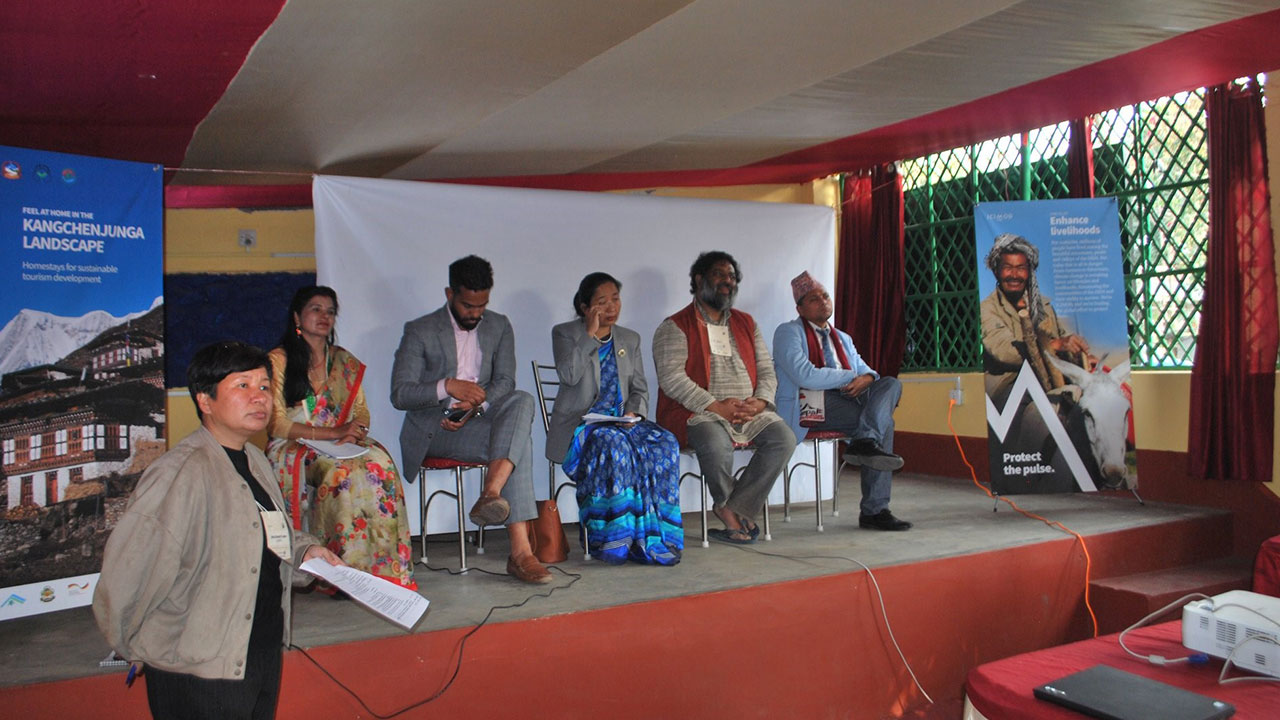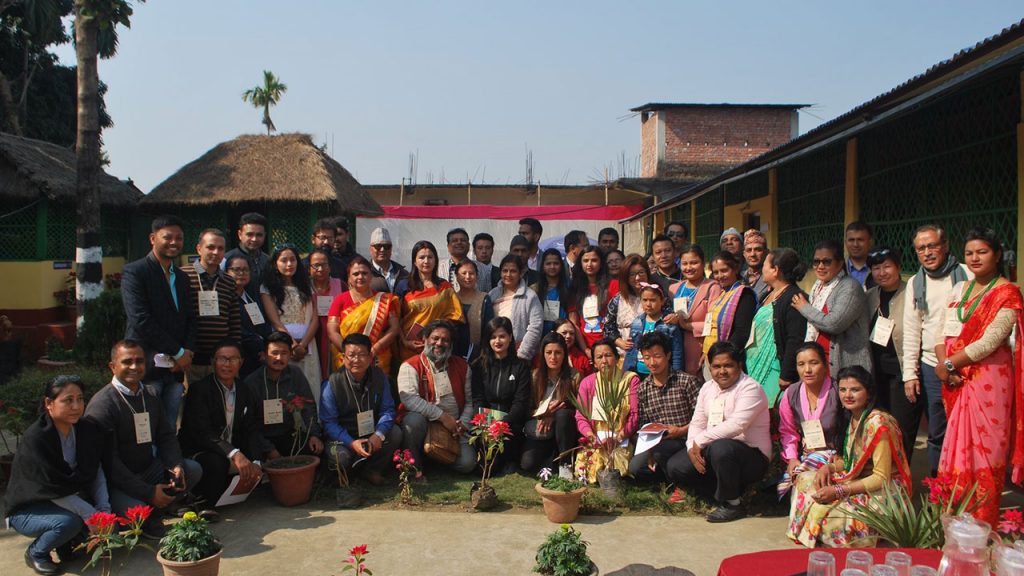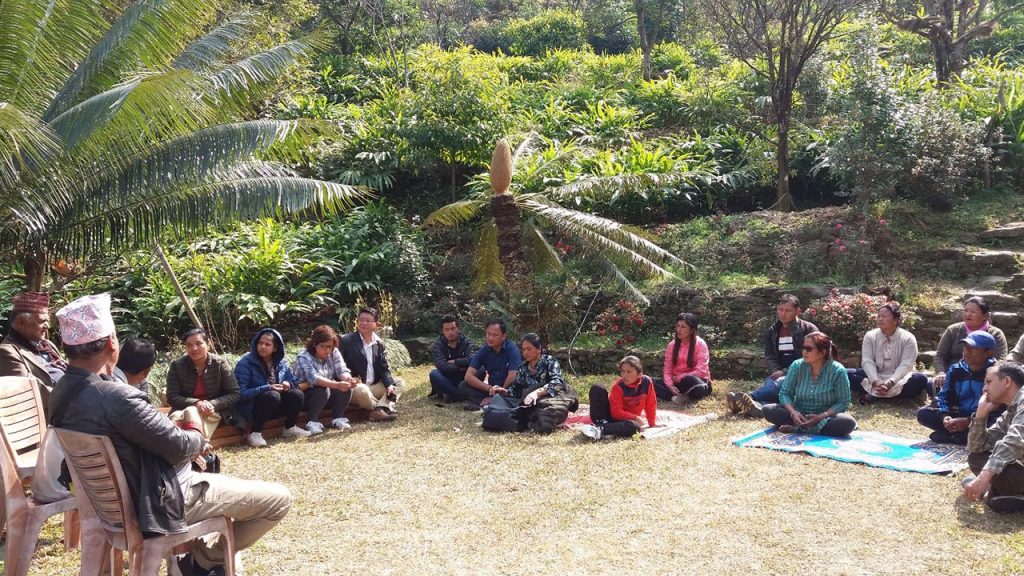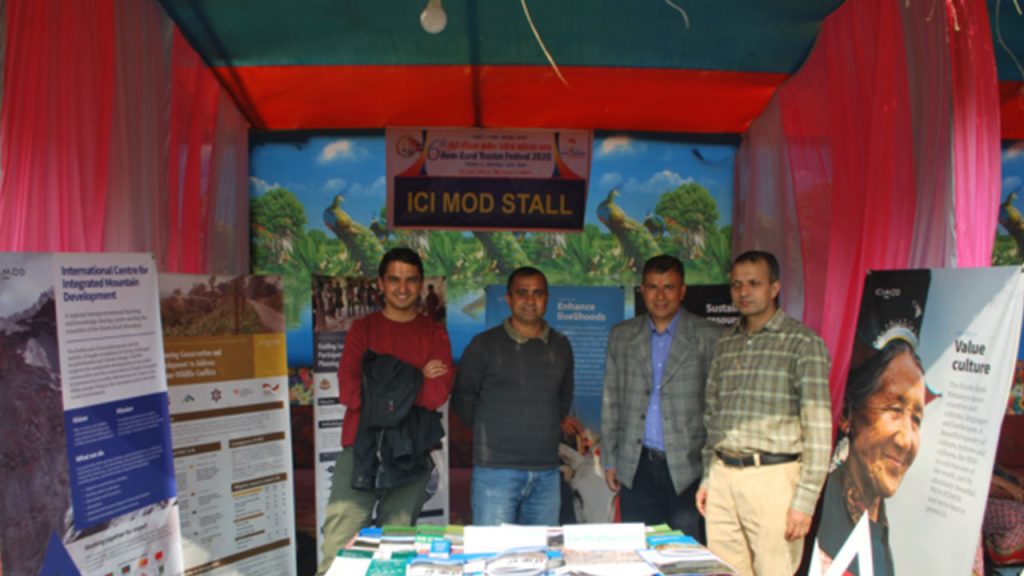This site uses cookies, as explained in our terms of use. If you consent, please close this message and continue to use this site.
 Panel discussion at the Homestay Congress 2020 with policy makers and practitioners (L–R: Anu Kumari Lama, Tourism Specialist, ICIMOD; Suman Ghimire, Regional Officer, Nepal Tourism Board; Raj Basu, Founder, Help Tourism, Siliguri India; Hon. Sita Thebe, Member of Parliament, Province 1; Ravindra Shekhawat, General Manager, PEAK DMC, Intrepid Group; Lila Bhattarai, Chairperson Maipokhari Homestay Management Committee, Nepal) (Photo: Nakul Chettri/ICIMOD)
Panel discussion at the Homestay Congress 2020 with policy makers and practitioners (L–R: Anu Kumari Lama, Tourism Specialist, ICIMOD; Suman Ghimire, Regional Officer, Nepal Tourism Board; Raj Basu, Founder, Help Tourism, Siliguri India; Hon. Sita Thebe, Member of Parliament, Province 1; Ravindra Shekhawat, General Manager, PEAK DMC, Intrepid Group; Lila Bhattarai, Chairperson Maipokhari Homestay Management Committee, Nepal) (Photo: Nakul Chettri/ICIMOD)
Homestays serve as an essential aspect of rural tourism in the Kangchenjunga Landscape (KL). They integrate sustainable resource utilization (especially the use of local food ingredients), promotion and protection of the natural environment, and recognition of the importance of ecosystem services – all within a sustainable business model. ICIMOD’s Kangchenjunga Landscape Conservation and Development Initiative (KLCDI) has been promoting homestay development in the KL through various long- and short-term ecotourism development initiatives within its partner countries: Bhutan, India, and Nepal.
Accordingly, KLCDI organized the Homestay Congress 2020 during the 6th Asian Rural Tourism Festival (ARTF), held in Kakarbhitta of Mechinagar Municipality in Nepal from 9 to 13 February 2020. This Congress aimed to promote knowledge and experience sharing among homestay operators across the KL and identify pathways for scaling up homestays across the region. The 6th ARTF – with its objective to promote rural tourism in Nepal’s Province 1 across regional, national, and international scales – provided an important platform for the Congress to be organized.
The Congress brought together a wide range of stakeholders such as homestay operators from eastern Nepal, Darjeeling, and Sikkim; government officials; and private sector and non-government organization representatives. It was chaired by Hon. Sita Thebe, Member of Parliament, Province 1. Homestay operators from India and Nepal shared their experiences on operating their homestays, speaking in depth about the monetary benefits, employment generation, and promotion of social and cultural traditions and heritage. They underlined how homestays are an ideal tool to promote sustainable development in rural and marginalized areas. Sharing her view of what homestays mean to her, Marmit Lepcha, Marketing Officer at Dzongu Homestay in India, remarked, “Homestays are an institution for all global citizens interested in nature, culture, local cuisine, language, and identity.”

The interactions during the Congress emphasized the need to focus on the development of immersive experiences in nature and culture; cross learning among homestay operators on forward linkages such as marketing strategies, branding, harmonization, and packaging of homestay products; and the development of participatory methods by governments in formulating policies that provide an enabling environment for scaling up homestays.
As far as forward linkages are concerned, effective scaling operations have begun to promote homestays at the global and regional levels. At the global level, PEAK DMC of Intrepid Group, Australia, has been collaborating with ICIMOD to showcase homestays in Haa, Bhutan, to the global market. According to Ravindra Shekhawat, General Manager of PEAK DMC, homestays are rapidly increasing alternative forms of the immersive experience-based tourism market. Homestays offer elements that the company considers to be major selling points. Through partnerships with ICIMOD, the company has started packaging Haa homestays to offer to the global market.
At the regional level, several India-based tourism associations such as Himalayan Homestays Owners Association, Association of Conservation and Tourism, Help Tourism, and Darjeeling Homestays Owners Association have expressed interest and commitment to join hands with eastern Nepal-based tourism associations, homestay management committees, and communities to promote circuit tourism among Nepal, India (Sikkim and West Bengal), and Bangladesh. At the policy level, provincial government encouraged and welcomed tourism entrepreneurs to lead homestay development in the region. Similarly, discussions during the Congress highlighted the need for and importance of engaging women and the youth to reap the benefits of homestays. This would also uphold the spirit of Nepal’s federal system of governance and contribute to poverty eradication through inclusive and equitable growth.
The Congress saw a series of interesting deliberations by stakeholders with direct and indirect interests in homestay development and management in the KL. These deliberations provided insights into the scope and scale of homestay development and prevailing issues and emerging opportunities to strengthen and expand homestays within the KL region. In this regard, several actions – such as ensuring an enabling mechanism (policy, research, infrastructure, and connectivity); sharing of knowledge and experiences regarding best practices of homestay operation within the region (Bhutan, India, and Nepal); and branding and harmonizing products – were highlighted as effective collaboration mechanisms among the stakeholders. To start with, the stakeholders identified the need for an umbrella organization in the KL that would develop a common branding for homestays.
The event proved to be a much needed initiation of cooperation among various stakeholders having a shared goal to promote and scale-up homestays in the KL, and ICIMOD highlighted the importance of knowledge creation, sharing, and continual cooperation to achieve this goal.

Apart from the Homestay Congress deliberations, a field visit was organized for participants to learn from the Nepali experts operating homestays in Salakpur, Ilam. Additionally, ICIMOD also set up an exhibition stall to showcase knowledge products on the HKH and the KL region. In parallel, rapid assessment of the economics of festivals was carried out, for which data were collected from stall hosts and visitors attending the 6th ARTF. Information such as average daily transactions, views from and objectives of visitors concerning the festival, and types of activities they spent money on were collected. There was a general consensus among visitors and stall hosts alike that cross-culture interaction was the most important aspect of the festival. Stall hosts expressed their eagerness to participate if the festival were to happen next year, while most visitors also agreed that the festival was largely successful and were looking forward to the festival next year.

(This news piece was jointly prepared by Anu Kumari Lama, Biraj Adhikari, Kamal Aryal and Nakul Chettri.)
Stay up to date on what’s happening around the HKH with our most recent publications and find out how you can help by subscribing to our mailing list.
Sign Up